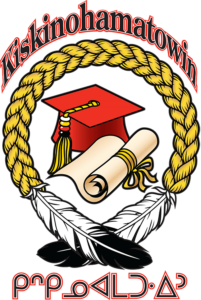- The Kiskinohamatowin Alternative Secondary School Program (ASSP) is a partnership between the Timmins Native Friendship Centre (TNFC) and District School Board Ontario North East (DSB ONE), as well as with the OFIFC (Ontario Federation of Indigenous Friendship Centres) and the Ministry of Education.
- The Kiskinohamatowin ASSP is a full-time alternative high school program that includes independent learning, as well as teacher-led courses. (PLAR courses, interdisciplinary courses and co-op opportunities have also been offered.)
- Kiskinohamatowin ASSP graduates receive an OSSD (Ontario Secondary School Diploma) as they would in a mainstream high school.
- The Kiskinohamatowin program provides a culture-based alternative to mainstream school and aims to help reduce barriers and to promote overall student wellness throughout the educational experience. In the Kiskino classroom, we use a strength-based, trauma informed, holistic approach to help support learners to recognize and build on their strengths in order to meet their self-defined vision of success.
- The word Kiskinohamatowin means “Learning from Each Other”.
Program Goals
- “The purpose of the Alternative Secondary School Program (ASSP) is to address the needs of disengaged urban Indigenous students and help them complete their Ontario Secondary School Diploma (OSSD). The ASSP aims to incorporate cultural teachings and learning approaches as they prepare students for workplace readiness, skills development and training, or for transitions to mainstream high schools or postsecondary institutions.
- The ASSP seeks to improve Indigenous students’ success at the secondary level, to increase graduation rates of ASSP students and to positively impact the well-being of Urban Indigenous learners in Ontario’s education environments.”
Program Objectives
- Facilitate a safe learning environment for Urban Indigenous learners within Friendship Centres in Ontario and in other community settings where applicable;
- Incorporate cultural information, resources, and materials, as well as activities to facilitate students’ learning processes;
- Provide a safe, non-threatening learning environment which promotes a sense of belonging for learners;
- Incorporates self-esteem building interventions into service delivery to promote mental and emotional well-being for the students in the program;
- Ensure services are geared toward emphasizing holistic wellness and student success;
- Incorporate culturally appropriate assessments and evaluation tools in order to provide a culturally-based educational program.
Through these facets, the Alternative Secondary School Program provides students with the necessary resources to gain credentials towards completion of their OSSD.
Target Population
- Kiskinohamatowin learners are generally between the ages of 16 and 21 years old, who have had some experience with mainstream school and feel that the cultural component, the experiential aspect and the alternative nature of the Alternative Secondary School Program would be beneficial.
- Past eligibility requirements have included the following:
- Learners are to be over the age of 16 and demonstrate an appropriate level of maturity for the program;
- Learners will have experienced a mainstream secondary school setting prior to enrolling in the Kiskinohamatowin Alternative Secondary School Program;
- Learners must not have been enrolled in a secondary school program for 1 year;
- Learners must be able to commit to attending class on a regular basis;
- Learners must be motivated to learn and complete work independently;
- Learners should be comfortable participating in extracurricular activities and open to becoming active members of the community.
Services Offered (Program Interventions, Activities, Services and Supports)
- Daily Meal Program (Breakfast, Lunch and Snacks);
- Land-Based Education and Cultural Activities / Traditional Teachings in Partnership with TNFC Programs and External Agencies;
- Holiday-Themed Activities; Field Trips / Guest Speakers (in non-COVID times)
- Formal and Informal Check Ins; One to One Support;
- General Guidance, Support and Advocacy;
- Referrals as Needed (Within and Outside TNFC)


